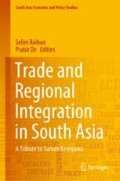Abstract
The South Asian regional economic integration process has garnered only limited global attention despite decades of efforts at national and regional levels to dismantle trade and investment barriers within the region.
Access this chapter
Tax calculation will be finalised at checkout
Purchases are for personal use only
Notes
- 1.
See Dee (2012) for a discussion of economic reform processes in South Asia.
- 2.
The South Asian Association for Regional Cooperation (SAARC) set-up in 1985 established an Inter-Governmental Group on Trade Liberalisation in 1991. Its proposal that SAARC adopt a preferential trade arrangement was accepted in 1993.
- 3.
In discussing South Asia, the rest of the paper relates primarily to Bangladesh, India, Pakistan and Sri Lanka.
- 4.
Sri Lanka’s ‘second wave of reforms in 1989–90 also followed a change of leadership amid a weak economic environment.
- 5.
This was not always the case. For example, Sri Lanka’s two main political parties, the Sri Lanka Freedom Party (SLFP) and the United National Party (UNP) draw support primarily from the rural voter base, and urban and business sectors, respectively. In Bangladesh, the Awami League (AL) and the Bangladesh National Party (BNP) have similar voter preferences, as does India’s Congress party and the Bharatiya Janata Party (BJP).
References
Ahulwalia, M. (2002). Economic reforms in India Since 1991: Has gradualism worked? Journal of Economic Perspectives, 16(3), 67–88.
Candland, C. (2002). The political element in economic reform: Labour institutions and privatization patterns in South Asia. In M. P. Posusney & L. Cook (Eds.), Labour and privatization: Responses and consequences in global perspective (pp. 65–82). Brookfield: Edward Elgar.
Dee, P. (2012). Economic reform processes in South Asia: Towards policy efficiency. London: Routledge.
Desai, V. V. (2010). The political economy of regional cooperation in South Asia. ADB Working Paper Series on Regional Economic Integration No. 54. Manila: Asian Development Bank.
Helliwell, J. (1994). Empirical linkages between democracy and economic growth. British Journal of Political Science, 24, 225–248.
Hill, H. (2013). The political economy of policy reform: Insights from Southeast Asia. Asian Development Review, 30(1), 108–130.
Hossain, M., Isla, I., & Kibria, R. (1999). South Asian economic development, transformation, opportunities and challenges. London: Routledge.
Kher, P. (2012). Political economy of regional integration in South Asia. Geneva: United Nations Conference on Trade and Development.
Kumar, R., & Hussain, I. (2010). Reviewing structural reforms in India and Pakistan. A paper presented at the East Asia Bureau of Economic Research (EABER) Conference, 11–12 February, Canberra: Australian National University.
Mahbubul Haq Human Development Centre. (1999). Human development in South Asia: The crisis of governance. Karachi: Mahbubul Haq Human Development Centre.
Mahmud, W., Ahmed, S., & Mahajan, S. (2008). Economic reforms, growth, and governance: The political economy aspects of Bangladesh’s development surprise. Washington, D.C.: World Bank.
Moore, M. (1985). The political economy of stabilization. World Development, 13(9), 1087–1091.
Rana, P. B., & Chia, W. (2015). Economic policy reforms in South Asia: An overview and the remaining agenda. RSIS Working Paper. Singapore: Nanyang Technological University.
Rodrik, D. (1997). Democracy and economic performance. Paper prepared for a conference on democratization and economic reform in South Africa, Cape Town, January 16–19. Retrieved from https://drodrik.scholar.harvard.edu/files/dani-rodrik/files/democracy-economic-performance.pdf.
Transparency International. (2014). Fighting corruption in South Asia: Building accountability. Transparency International. Retrieved from https://www.transparency.org/whatwedo/publication/fighting_corruption_in_south_asia_building_accountability.
Weerakoon, D. (2010). The political economy of trade integration in South Asia: The role of India. The World Economy, 33(7), 851–957.
Weerakoon, D. (2012). Sri Lanka’s economic reform process: Progress and constraints. In P. Dee (Ed.), Economic reform processes in South Asia: Towards policy efficiency (pp. 173–190). London: Routledge.
World Bank. (2008). The political economy of policy reform: Issues and implications for policy dialogue and development operations. Washington, D.C.: World Bank.
Author information
Authors and Affiliations
Corresponding author
Editor information
Editors and Affiliations
Rights and permissions
Copyright information
© 2020 Springer Nature Singapore Pte Ltd.
About this chapter
Cite this chapter
Weerakoon, D. (2020). Political Economy of Policymaking: South Asia in Perspective. In: Raihan, S., De, P. (eds) Trade and Regional Integration in South Asia. South Asia Economic and Policy Studies. Springer, Singapore. https://doi.org/10.1007/978-981-15-3932-9_5
Download citation
DOI: https://doi.org/10.1007/978-981-15-3932-9_5
Published:
Publisher Name: Springer, Singapore
Print ISBN: 978-981-15-3931-2
Online ISBN: 978-981-15-3932-9
eBook Packages: Economics and FinanceEconomics and Finance (R0)

